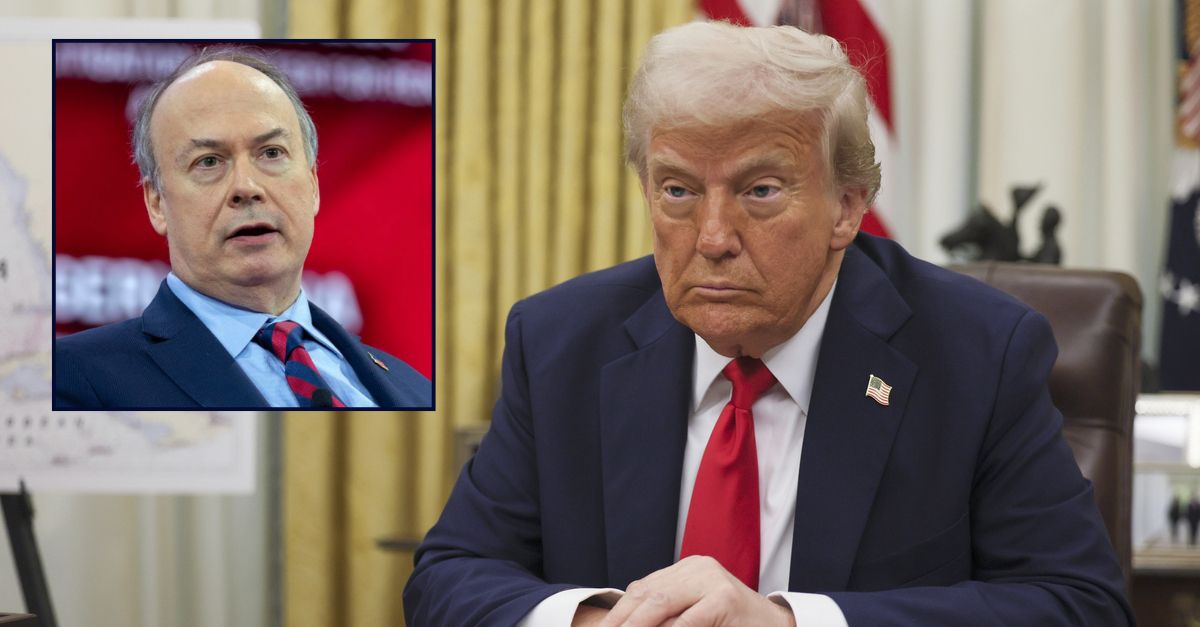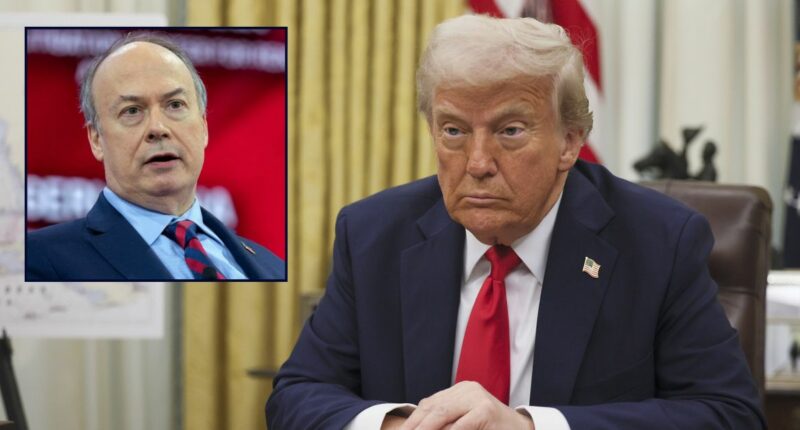
Inset: Former Justice Department official Jeffrey Clark speaks during the Conservative Political Action Conference, CPAC 2024, at the National Harbor, in Oxon Hill, Md., Friday, Feb. 23, 2024 (AP Photo/Jose Luis Magana). Background: President Donald Trump listens to a question from a reporter before signing an executive order in the Oval Office of the White House in Washington, Monday, March 31, 2025 (Pool via AP).
The legal disciplinary board for attorneys in Washington, D.C., has recommended former U.S. Department of Justice attorney Jeffrey Clark be disbarred over his role in efforts to overturn the results of the 2020 presidential election to favor President Donald Trump.
On Thursday, the District of Columbia Court of Appeals Board on Professional Responsibility ruled on motions filed by Clark and the D.C. Bar Office of Disciplinary Counsel – seeking review of an April 2024 ruling recommending he lose his law license.
The board, effectively a court of appeal in the federal district”s lawyer discipline system, declined to disturb the earlier committee’s ruling.
“Considering all of the facts proven by Disciplinary Counsel, we conclude that Respondent should be disbarred because he attempted to engage in flagrant dishonesty,” the 111-page report summarizes.
The recommendation, while highly critical of Clark’s actions, makes clear that the recommendation is not a final order of discipline.
Love true crime? Sign up for our newsletter, The Law&Crime Docket, to get the latest real-life crime stories delivered right to your inbox.
The basis of the bar complaint against Clark was focused on an unsent draft letter falsely claiming the DOJ “identified significant concerns that may have impacted the outcome of the election in multiple states, including the state of Georgia.”
The specification of charges said that Clark violated D.C. Rules of Professional Conduct 8.4(a) and (c) (“in that respondent attempted to engage in conduct involving dishonesty, by sending the proof of concept letter containing false statements”) and Rules 8.4(a) and (d) (“in that respondent attempted to engage in conduct that would seriously interfere with the administration of justice”).
The so-called “proof of concept letter” is the draft Clark compiled that also would have urged legislatures in states where Trump lost to “send an unauthorized slate of electors to Congress,” according to the charges.
On the whole, the board endorsed the disciplinary counsel’s findings.
“[T]he charges against [Clark] focus on the truthfulness of the factual assertions contained in the Proof of Concept letter that he authored,” the report reads. “On the merits, we conclude that Disciplinary Counsel proved by clear and convincing evidence that Respondent attempted to make intentionally false statements when he continued to advocate that the Justice Department issue a letter containing falsehoods.”
More Law&Crime coverage: ‘Undercuts the very notion of our constitutional democracy’: Appeals court disbars Trump attorney Kenneth Chesebro ‘based on his conviction of a serious crime’
Clark, for his part, argued he had personal misgivings concerning the integrity of the presidential election won by Joe Biden.
The board rejected those arguments – largely crediting testimony from former DOJ officials, including then-acting assistant attorney general Jeffrey Rosen and Rosen’s deputy Richard Donoghue.
During their testimony, those DOJ witnesses testified Clark tried to weaponize the department, advanced clearly debunked claims about electoral fraud, and even threatened to replace them should they not bend to the will of the then-president.
“Although the hearing witnesses agreed that [Clark] had sincere personal concerns about the integrity of the 2020 election, they also agreed that the Justice Department had not identified potentially outcome-determinative issues in Georgia or other states,” the report goes on. “[Clark] knew that because Messrs. Rosen and Donoghue told him so. Thus, [Clark’s] conduct constituted an attempt to make intentionally false statements about the results of the Justice Department’s investigation.”
More Law&Crime coverage: ‘Lied to courts’: Appeals court affirms disbarment recommendation for Trump attorney John Eastman
In supporting the hearing committee’s initial findings, the board goes quite a bit further in terms of prospective punishment. The originally proposed sanction was a two-year suspension.
From the report, at length:
A majority of the Board recommends that Respondent be disbarred. We recognize that there are no factually comparable prior disciplinary cases. But that is not surprising given the underlying facts. In making this recommendation, we are mindful of the need to maintain the integrity of the legal profession and deter the respondent and other attorneys from engaging in similar misconduct. Lawyers must observe the highest standard of professional conduct. At a minimum, they must be honest. While dishonesty is always intolerable, the facts here are significantly aggravating to warrant disbarment: Respondent was prepared to cause the Justice Department to tell a lie about the status of its investigation of an important national issue (the integrity of the 2020 Presidential election). Lawyers cannot advocate for any outcome based on false statements and they certainly cannot urge others to do so. Respondent persistently and energetically sought to do just that on an important national issue. He should be disbarred as a consequence and to send a message to the rest of the Bar and to the public that this behavior will not be tolerated.
Clark, in his own motions, pushed for a slap on the wrist in the form of a “private admonition,” which is not a form of discipline for lawyers that is countenanced by the D.C. Court of Appeals.
The board’s decision in favor of disbarment was not, however, unanimous.
Two members suggested Clark be suspended for three years – pending the outcome of a “fitness requirement” which is “intended to be an appropriate response to serious concerns about whether the attorney will act ethically and competently in the future, after the period of suspension has run.”
Even in the minority, those two members strongly upbraided Clark.
“Respondent sought to have the Justice Department lie about a ‘pressing matter of overriding national importance,’ despite being told in no uncertain terms that it was a lie, and he does not appreciate the significance of his misconduct,” the minority report reads. “Those considerations ‘cast a serious doubt upon the attorney’s continuing fitness to practice law.’ A fitness requirement would appropriately protect the public.”







